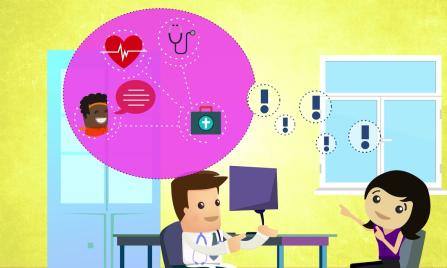-
Who we are
WHO WE AREThe International Organization for Migration (IOM) is part of the United Nations System as the leading inter-governmental organization promoting since 1951 humane and orderly migration for the benefit of all, with 175 member states and a presence in over 100 countries. IOM has been in Portugal since 1976.
About
About
IOM Global
IOM Global
-
Our Work
Our WorkAs the leading inter-governmental organization promoting since 1951 humane and orderly migration, IOM plays a key role to support the achievement of the 2030 Agenda through different areas of intervention that connect both humanitarian assistance and sustainable development.
- Data and Resources
- Take Action
- 2030 Agenda
Given a recent increase in migration flows and its diverse migration context, Portugal has promoted continued efforts to improve migrants’ access to health care. According to national laws, they have the same rights and duties as the Portuguese population. However, barriers in accessing health care services persist, as the existing legislation is not always systematically applied by health professionals, administrative personnel, and social workers.
With the overall goal of contributing to ensuring a more equitable health care to the migrant population, IOM Portugal started in 2020 the project “Fostering Integration by Addressing Health Equity – Phase II” in partnership with the Directorate-General of Health (DGS) and Regional Health Administrations (ARS).
Within this project, IOM developed leaflets in 10 different languages regarding different subjects related to migrant's access to health in Portugal. You can find more information here.
Funded by the Asylum, Migration, and Integration Fund (AMIF) and co-funded by DGS, the project has three specific objectives:
- 1. Promote inter-sectoral cooperation between health service providers and non-health service providers
-
IOM mapped 356 non-health actors operating in Portugal to learn about their practices to improve migrants’ health conditions and access to health care. These include migrant associations, non-governmental associations (NGO), municipalities, foundations, state organizations operating on national and local levels, academia, private sector, religious organizations providers of social services, international organizations, and private institutions of social solidarity (IPSS).
- 2. Develop the individual competences of health professionals
-
IOM created an interactive e-learning course for health professionals working in primary health care, such as doctors, nurses, social workers, psychologists, front office staff, and technicians, as they are the ones having direct contact with migrants, refugees, and asylum seekers in Portugal.
The 12-hour e-learning course was divided into four modules: migration and health; intercultural mediation; psychosocial aspects of migration; and rights and access to health in Portugal.
Nine national experts from academia, the Portuguese Directorate-General of Health (DGS), NGOs, intercultural mediation services, and municipalities supported IOM to develop the training curriculum.
A total of 276 health professionals successfully concluded the e-learning course, which is now open to the public through this link: https://www.nau.edu.pt/pt/curso/migracao-e-saude/
- 3. Support health services in responding to migrants’ health needs and vulnerabilities
-
IOM will organize a national technical working group composed of relevant health authorities, civil society representatives, academics, and experts who will work together to determine the appropriate indicators on the health status of migrants and the processes for better integrating them in the National Health System.
.jpg)
The initiative gives continuity to former IOM project “Fostering Integration by Addressing Health Equity”, concluded in 2018. It also consolidates the collaboration with DGS and further operationalizes the Memorandum of Understanding signed in 2015 between DGS and IOM.
This project directly contributes to the National Plan for the Implementation of the Global Compact on Migration. The health of migrants is an essential cross-cutting issue relevant to many SDG targets, primarily for SDG 3 and target 3.8 “Achieve Universal Health Coverage”.

